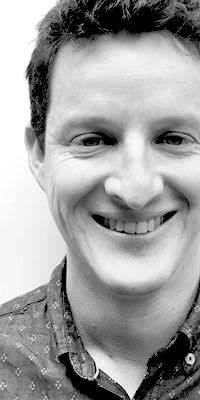Workshops
Brad Frost
Atomic Design, Responsive Design Patterns, and More!
Monday 16th February, 9:00am—5:00pm
Michael Fowler Centre
This workshop has now sold out. If you wish to be waitlisted, email: Natasha Lampard.
This workshop is a full-day masterclass that takes a deep dive into the world of responsive web design, covering everything including broad concepts, strategy, how responsive design affects process, responsive design patterns and principles, and more.
Responsive design is a huge topic so unfortunately it’s impossible to pack everything about it into a single day. But that doesn’t mean we can’t try, right? Here’s what will be covered:
-
The ever-shifting landscape – The web landscape is getting more diverse every single day, and this section will address why responsive web design is becoming increasingly essential
-
Approach – There’s more than one way to skin this mobile web cat. We’ll look at the various strategies being used to approach the multi-device Web landscape
-
Foundations of Responsive Design – Responsive web design 101. Fluid grids, flexible media and media queries make up the core of responsive web design
-
Principles of Adaptive Design – What beyond layout do we need to concern ourselves with when creating great multi-device web experiences? We’ll cover how ubiquity, flexibility, performance, enhancement and future-friendliness are powerful principles for making great adaptive web experiences.
-
Atomic Design– Introduce a design methodology for creating robust design systems, and introduce Pattern Lab, a tool for creating atomic design systems
-
Strategy and Workflow – Our websites are fluid, so our process and workflow needs to be fluid as well. This section will tackle thorny areas like convincing clients and colleagues, and discuss tools and techniques to effectively design in the Post-PSD Era.
-
Responsive Patterns – Creating adaptive interfaces is challenging, but thankfully the Web community is hard at work creating flexible, downright innovative design patterns. We’ll look at how to tackle layout, navigation, images, data tables, and really anything else you can put in an interface.
-
Development Best Practices – The way we build websites has changed. We’ll discuss mobile-first development, CSS techniques, “support” vs “optimization”, device testing and more to help you develop future-friendly web experiences.
What you'll learn
You’ll learn different approaches to responsive design projects, the why and how of atomic design, common effective responsive design patterns, modern responsive design best practices.
Who it's for
It’s for web designers, developers, and anyone working on responsive design projects.
What to bring
You’ll need brains and something to take notes with.
Kate Kiefer Lee
Writing for the Web with Style and Purpose
Monday 16th February, 9:00am—5:00pm
Michael Fowler Centre
This workshop has now sold out. If you wish to be waitlisted, email: Natasha Lampard.
This workshop will help you improve your writing and editing skills, giving you tools you can immediately take back to work. We’ll talk about how to address business goals and readers’ needs while maintaining a consistent voice and adapting your tone based on the content type. And we’ll cover how to craft public content like marketing copy, interface flows, blog posts, and emails, as well as behind-the-scenes documents like mission statements and style guides.
We’ll dive deep into the writing process and do some practical exercises along the way. You’ll organize your content types, sketch pages and flows, work on a voice and tone guide, and exchange feedback with other participants. This workshop will give you the skills and motivation you need to write with confidence, and you’ll leave with building blocks for developing content standards within your organization.
What you'll learn
You’ll learn how to:
- Write clear, friendly, and useful web content
- Find your voice and adapt your tone for different situations and content types
- Develop content in modular chunks
- Sketch web pages and interface flows
- Create a simple style guide
- Articulate your mission and work toward it as you write
Who it's for
The workshop is for anyone who works on website content. Experienced writers will deepen their skills, and new writers will jump right in with the exercises.
What to bring
Bring a pen and a laptop if you’d like.
Janet Crawford
Designing, building and nourishing your work culture
Monday 16th February, 9.00am—5:00pm
Michael Fowler Centre
$650 if attending conference,
$795 if not
People want to work for a company where they can contribute, where they feel valued, and also where they feel they belong. A company’s culture can repel or retain employees.
As a group, we’ll explore the values that are important for you, your team, and your company. We will then take a deep dive into three foundational areas for building healthy and sustainable cultures, with an emphasis on practical implementation.
What you'll learn
You’ll walk away from this workshop with a deeper understanding of what “culture” means in a business context and how cultural values reveal themselves through organisational metaphors and behaviours.
After a romp though some basic neuroscience principles, we’ll look at how to build cultures that leverage the best in human biology, while avoiding predictable, but common breakdowns.
We’ll delve into the practices and behaviors of accountability, and we’ll examine the differences between innovation and production cultures, along with keys for peaceful co-existence.
Who it's for
This is for anyone who in interested in influencing the culture of their company. Whether as an as an individual wanting to start a new venture, as an employee in a startup, or a member of a team in a large organization.
What to bring
Anything you want to take notes in.
Derek Featherstone
Responsive Design and Accessibility
Tuesday 17th February, 9:00am—5:00pm
Michael Fowler Centre
$650 if attending conference,
$795 if not
Web design and development used to be “easy” in the days when we designed for fixed 640×480, 800×600, and 1024×768 pixel screens. Now, we have more screen sizes than we can possibly keep track of or even test with, not to mention the different devices we need to consider. Responsive web design sets us up for success by ensuring that we’re creating sites that work well on a vast array of devices of different sizes and capabilities. We get ahead of the curve by using responsive web design to build for the future. But there’s more to this story. There’s much, much more.
The online world is changing: sites are global, our audience is getting older, and people with disabilities are using our sites more every day. Beyond platforms and screen sizes, how will we design for all these different user needs? Internationally recognized accessibility champion Derek Featherstone is here to share the rest of the story: the story where we take all the great parts of what makes a site responsive and combine them with all the care and thoughtfulness that also makes a site accessible to all users. That’s the next step. That’s our future.
What you'll learn
Join Derek for this full day of insights, design strategy, and development techniques for creating responsive sites that are also accessible. In this session, attendees will:
- See how responsive web design and accessibility go hand in hand.
- Learn to design for low-vision mobile and tablet users.
- Discover which responsive web design patterns can cause significant accessibility issues.
- Understand how to identify accessibility needs during responsive web design.
- Use modern coding techniques to fix the accessibility needs that you identify.
- Gain a greater understanding of the state of mobile assistive technology.
Who it's for
This workshop is appropriate for everyone — for UX designers, developers, QA professionals, and even project or product managers, no matter how far along you are in your career and experience with accessibility. If you want to get stuck in and have a full day of practical experience on how to take accessibility into account in your responsive design and development, how to find some of the trickiest accessibility issues with mobile and tablet use today, and be able to use the assistive technology you’ve got in your pocket to test your or your team’s work, then yes, this is definitely for you.
What to bring
You’ll need to bring your computers if you wish, but MORE importantly, its BYOD (bring your own device) — you should bring your iphones, android phones, windows phones, or whatever devices you have… tablets work too! Bottom line, you need to bring your device AND a set of headphones for listening to the screen readers on your devices.
Kim Goodwin
Turning data into design: journey maps, scenarios and storyboards
Tuesday 17th February, 9:00am—5:00pm
Michael Fowler Centre
This workshop has now sold out. If you wish to be waitlisted, email: Natasha Lampard.
Once you have data from user research, how do you turn that into a compelling design solution…and herd the cats along with you? It’s especially tough when you have to work around limited project scope and organizational silos. That’s the focus of this full-day workshop.
Storytelling is a powerful tool, both for unleashing our imaginations and for persuading others. We’ll start by turning qualitative data into a type of story, using journey mapping to help the team identify opportunities. From there, we’ll use storytelling in a generative way: creating ambitious stories at the level of a service design scenarios to broaden our thinking and develop a vision, then scoping down into detailed product-level scenarios from which to sketch. We’ll then use scenarios to guide our storyboarding, which is a sequential approach to sketching. We’ll even take a look at how scenarios can help translate your research data into visual design priorities.
Topics will include:
- Benefits of using journey maps, like bridging the gap between problem and solution, persuading the team to come along…even sharpening your interview skills.
- Techniques for developing effective journey maps from interview data, with a chance to practice.
- Comparing scenarios to use cases, Agile user stories, and requirements.
- Deciding when to use different types of scenarios.
- Using personas (or not) in your scenarios and design.
- Creating an effective scenario, with a chance to practice developing several types.
- Using scenarios to generate clear, effective requirements.
- Using scenarios to help translate solutions to any channel or platform, whether you’re mobile-first, desktop-focused, or translating between digital and brick-and-mortar.
- Using your initial scenarios to drive structure and flow in your sketching, then using increasingly detailed scenarios to iterate and test the solution—fast!
- Supporting design decisions with scenarios, even at the pixel level.
- Using scenarios to sell your solutions.
Expect realistic exercises where you’ll put theory into practice. Throughout the session, we’ll discuss practical realities like limited scope, skeptical stakeholders, and the challenges inherent in certain industries or consumer settings. Bring your questions and frustrations as well as your success stories!
What you'll learn
You’ll learn how to:
- Narrow the gap between understanding your users and knowing what to do about it
- Develop a shared view of the problem, stop feature creep, and minimize opinion-based wrangling about solutions.
- Create user-centered solutions that don’t mirror your org chart or ignore users’ real cross-channel behavior.
- Make your user experience better by examining every touchpoint and using emotion–not just functions and tasks–to inform your choices.
- Fit scenarios seamlessly into your existing process, whether it’s Agile, waterfall, or Agile-fall.
- Make design choices and trade-offs visible to the team (and even users) quickly and cheaply.
- Help drive the requirements process instead of responding to it when it’s over.
Who it's for
This workshop is for any designer, engineer, or product manager who’s had to figure out what to build, how it should behave, and how it should look…and sell the rest of the team along the way. A solid grounding in interface design principles and patterns is helpful for the sketching exercises. Those with a lot of experience using scenarios may find parts of the session are a “refresher.” The content is equally applicable whether you’re designing something new or improving what you already have.
What to bring
Bring your willingness to experiment, collaborate, and create. A laptop or tablet might come in handy for one of the exercises.
Mathew Patterson
Building a Customer Service Culture
Tuesday 17th February, 9:00am—5:00pm
Michael Fowler Centre
$650 if attending conference,
$795 if not
A Google alert pings into your inbox; a customer is telling their audience that your amazing customer service has saved their job and made them look awesome to their boss. Another customer is telling your competitor that they should learn from you, and a third is proposing marriage to your web app.
-OR-
A google alert pings into your inbox; a customer is all-caps-tweeting about how you’ve ruined their day, and a bunch of people are chiming in with their own stories. Some of them are including your competitor in their tweets too.
Which one do you want to wake up to? There is no greater marketing tool than customers who love you. Finding those customers, nurturing a relationship with them and helping them succeed is the path to success, but it’s not always an easy path to tread.
In this workshop, you’ll learn how to design and scale a customer service team that doesn’t rely on you being a super hero. Instead, through practical examples, tested techniques and in depth discussion you will create a plan to embed customer service culture across your business, and create a company-wide environment in which great service is the natural outcome.
Discussions will be lead by Mat Patterson, head of customer service for the popular email marketing application Campaign Monitor. Mat has grown his team from one person to 26 people all over the world, achieving consistently exceptional customer happiness levels, and he’s also made plenty of mistakes so you don’t have to!
Learn from Mat and all the other attendees, and leave with a plausible, practical plan to create your own ideal customer service experience.
What you'll learn
Through this workshop you will be armed with tools, resources and ideas to create and scale an environment that produces consistently great customer service.
Core topics include:
- How to find the right people for your support team
- Practical ways to build and scale a customer focused culture without
dropping quality - How to communicate effectively in limited mediums like email and chat
- Giving your support agents the tools to succeed
- Defining success (metrics and more)
- Encouraging a service culture outside the support team
- The power of an animated gif
You should leave at the end of the day with practical, implementable ideas that apply to your specific situation, and with connections to a bunch of people in your situation that you can share with and learn from for years to come.
Who it's for
This workshop is for people who are truly committed to providing great customer service. You might be the founder of your own business, trying to balance the demands of customer service and the need to keep growing.
You might be working at a startup and trying to hold onto your current customers and attract new ones.
You might be working inside an organisation where customer service isn’t part of the culture, and you’re looking for ways to change that.
If you’re looking for someone to give you “Ten top tips for customer service!” this is not the workshop for you. This is for people who are genuinely interested in growing a culture of service in their organisations and who are willing to have some tough discussions to do it.
Mat’s experience is in fast growing small business, but the same principles have been successfully used inside larger companies.
What to bring
Nothing special, bring a laptop or notebook to take notes.
Frank Chimero
p.typographyForDevs
Wednesday 18th February, 9:00am—12:30pm
Michael Fowler Centre
$395 if attending conference,
$495 if not
Typography is hard and complicated for most. We can’t make it any less nuanced, but a little bit of knowledge can make typography less intimidating for those outside of the design field. This is especially true for developers: you know more than you think!
What you'll learn
In this workshop, we will learn the ropes of selecting typefaces and creating hierarchy for clear communication by looking at the overlaps between front-end development and typographic concepts. We’ll build your typographic knowledge by getting hands-on with front-end stuff you already know, like ems and CSS resets, *+*, and other things that look weird to normal people when you type them into computers. By the end, you’ll have a foundational knowledge of type and a swagger to your step that says you know your Tisa from your Quadraat.
Who it's for
Developers with a tiny bit of type knowledge. (Seriously—the smallest bit, like the difference between serif and sans serif fonts).
What to bring
Your laptop and a sunny disposition.
Des Traynor
Product Management for Growing Companies
Wednesday 18th February, 9:00am—12.30pm
Michael Fowler Centre
This workshop has now sold out. If you wish to be waitlisted, email: Natasha Lampard.
“Product Manager” is the new hot title for 2015. This workshop will teaches practical skills, actionable take-aways and easy-to-run exercises for understanding how to evaluate, manage, and grow a product from idea to product market fit and beyond.
What you'll learn
Topics include:
- Disruptive vs Sustaining Innovations
- The 5 methods of product management
- The Jobs to be Done framework product innovation
- How to interview customers & prospects to understand the role of your product
- How to scope a product, and manage a roadmap
- How to measure, get feedback on, grow and or kill features in your product
- Product strategies to follow for virality, 2 sided marketplaces, B2B SaaS, and more
Who it's for
This is for:
- Product managers for companies of all sizes
- Anyone developing a new internal or external product within their company
- Entrepreneurs and start-up founders.
- Designers tasked with taking a product from idea to inception.
- Consultants looking to strengthen their product design skills.
What to bring
Brains.
Nicholas Felton
Talking with Numbers
Wednesday 18th February, 9.00am—5:00pm
Michael Fowler Centre
$650 if attending conference,
$795 if not
If you consider yourself a communicator, it is no longer sufficient to simply be fluent with text and image. Data is transforming every profession and visual communication is no exception. Fortunately, data visualization is a young medium with mature tools and bountiful source material. In this workshop we’ll investigate a few large data sets from several angles… from spreadsheets to interactive visualizations built with Processing.
What you'll learn
Participants will learn to work with data sets from an initial interrogation to exploration via custom visualizations which will reveal the numerical narratives obscured within.
Who it's for
You need not have worked with data or data visualization before, but an understanding of spreadsheets and a knowledge of basic programming principles like control flows (loops, conditionals), variable types and arrays will be helpful. For more advanced participants we may be able to venture into connecting Processing to mySQL to experiment with data queries.
What to bring
- Laptop Computer
- Processing App (processing.org, free download for Mac or Windows)
- Spreadsheet App (Numbers or Excel)
- Vector Design App (Illustrator or similar)
Harper Reed
How to Build Resilient Teams Who Build Resilient Technology
Wednesday 18th February, 1:30pm—5:00pm
Michael Fowler Centre
This workshop has now sold out. If you wish to be waitlisted, email: Natasha Lampard.
Harper Reed spent 18 months as CTO, Obama for America. He and his team worked 16-hour days, six or seven days a week, trying to re-elect a president. It worked: they raised hundreds of millions of dollars online; they made unprecedented progress in voter targeting and they built everything atop the most stable technical infrastructure of any presidential campaign. They ultimately made it simpler and easier and more enjoyable for anyone to engage meaningfully with Obama and his re-election effort.
This was a high stakes game, and one not without its challenges. Without resilience, in both the team itself and the technology, this would not have been possible.
What you'll learn
In this workshop, Harper will share some of his experiences and insights during this time, sharing important insights for building resilient systems and teams. This will be an interactive workshop and the attendees should come to share as well as learn.
Along with some good laughs and stories of inhuman strength, you should expect to leave the workshop with a good framework for building teams, managing crisis and testing all the way.
Who it's for
This workshop is for people who care about their employees, their friends and enjoy being human. If you are not human or hate your employees, you should not come.
What to bring
Just the usual.














